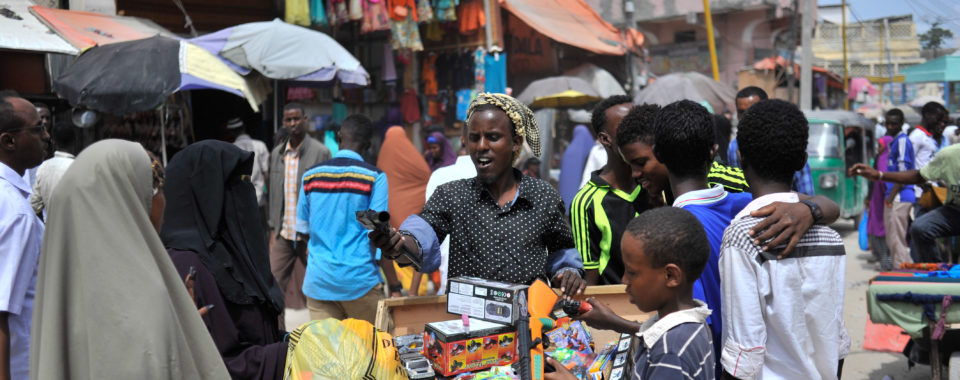BY ELIZABETH KARIUKI – INTERNATIONAL ALERT
International Alert is a peacebuilding charity that has worked for 30 years to lay the foundations for lasting peace in communities affected by violent conflict.
Unemployment, underemployment, and informal work remain significant challenges for the Horn of Africa.1 These problems have, in some situations, interacted with factors causing fragility in the region, namely, the refugee crisis, competition over cross-border resources, terrorism, piracy, climate shocks, lawlessness, communal conflicts affecting ethnic communities split across borders, porous borders, illegal cross-border trade, among other factors, thereby worsening existing conflicts and threatening regional stability.
The Horn of Africa has suffered consecutive shocks in recent times increasing its vulnerability. These include flooding, poor rainfall, invasion of desert locusts, the COVID-19 pandemic among other factors, all of which have severely impacted jobs and livelihoods. Reactive and proactive approaches to curbing the spread of the COVID-19 pandemic, have greatly impacted the way people interact, work, and make a living. Central to these approaches have been strategies intended to limit community spread through isolation and limiting movement and travel. The restrictions imposed by governments in the Horn of Africa in this regard have greatly impeded cross-border trade within the region thus negatively affecting the livelihoods of numerous people. In a bid to limit human contact, these restrictions have also drastically affected certain sectors including transport, hospitality, tourism, and entertainment. The impacts on small and medium enterprises in the Horn of Africa have also been severe when it comes to lockdowns as most SMEs are labour intensive. Thin liquidity reserves, limited access to credit and lack of disposable assets have also made it difficult for many of these businesses to survive the disruption and devastation occasioned by the pandemic. As a result, a lot of jobs have been lost.
Worsening diplomatic relations between Kenya and Somalia over a maritime border dispute coupled with the plans from the government of Kenya to close Dadaab refugee camp (which hosts a huge Somali community) and Kakuma refugee camp, are likely to heighten tension among affected communities. They are also likely to threaten the livelihoods of the fishing community in Kenya that depends on fishing in the disputed area. Further, the proposed action by the government of Kenya to repatriate refugees from both camps is likely to impact the livelihoods of hundreds of thousands of asylum seekers and refugees from different neighbouring countries facing similar and worse levels of fragility. These include Ethiopia, the Democratic Republic of Congo, South Sudan, Sudan, Burundi and Uganda. Additionally, the Tigray conflict threatens to escalate into a fully-fledged war and destabilise the already fragile Horn of Africa region.
Within the development and humanitarian communities there is a widely held assumption that has been influential in shaping the design of development programmes in the Horn of Africa. The assumption holds that jobs, livelihoods opportunities and other economic development interventions have the capacity to reduce conflict and violence by disincentivising the engagement of the unemployed and underemployed in crime and violence therefore fostering peace. Further, economic development interventions are seen as pivotal in facilitating social cohesion.
In the last four years, International Alert has been conducting research in Kenya, Ethiopia and Somalia geared towards interrogating this presumed nexus between jobs and peace and analysing the extent to which economic development interventions by state and non-state actors in these countries have contributed to peace. This work culminated into the development of research reports and practice notes2 that highlight best practices and factors to keep in mind when designing development programmes for fragile and conflict affected settings that embed conflict and gender sensitivity and yield peace outcomes and inclusive economic development. It has emerged from this work as well as analysis by other development practitioners and scholars that the creation of jobs and livelihood opportunities does not necessarily lead to peace. This is because the factors that trigger, perpetuate, and escalate conflict are complex, and peace cannot therefore be merely achieved through job creation.
Inclusive economic development is pivotal for sustainable peace as it addresses inequity, exclusion, and sustainability. In addition to inclusive economic development, sustainable peace depends on other factors, namely, good governance and fair access to power; fair access to opportunities to earn income and accumulate assets; fair access to justice; safety; and wellbeing are interlinked. Thus, job creation/livelihoods interventions need not focus on the number of jobs created or livelihood opportunities provided as a measure of success, but rather focus ought to be on the extent of inclusivity, equity and sustainability which can be measured by the distribution of employment and livelihoods opportunities, the targeting of these opportunities, and the resulting impact on poverty and conflict reduction.
As governments in the Horn of Africa and development partners roll out programmes to support the economic recovery of this region post-pandemic, it will be important for them to bear in mind that conflict and peace dynamics are frequently shaped by economic development. While protecting livelihoods and businesses and promoting economic recovery will be of paramount importance, interventions need to be inclusive and be informed by robust conflict and gender analysis. They also need to be based on a thorough awareness of the complexity of drivers of conflict and how they impact emerging conflict and peace dynamics. It is critical that this approach be a core part of the toolkit regional and international partners apply in facing the heightened risks of instability in the region over the next 12 months.
Endnotes
1. ILO, Employment for Peace, Stability and Development https://www.ilo.org/wcmsp5/groups/public/—africa/documents/meetingdocument/wcms_176826.pdf
2. Can more jobs bring peace?, International Alert, February 2020, https://www.international-alert.org/publications/can-more-jobs-bring-peace-kenya-somalia
Image from AMISOM Public Information licensed under Creative Commons Attribution-NonCommercial-NoDerivatives 2.0 Generic license.
